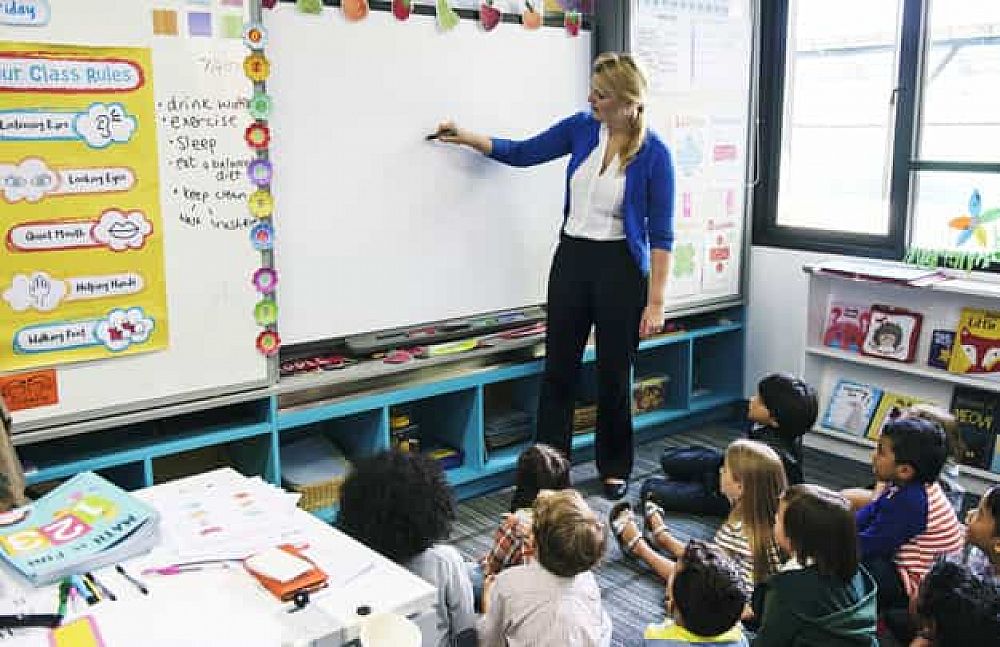The 4 Principles of Building Good Relationship With the Students

When I was younger, I had a dog that played fetch, walked to the park, and learned new tricks with me. Over time, we created a bond that was irreplaceable and unconditional. One day my dog passed away and three weeks later, my family and I decided to get a new dog. This new dog was friendly at first but hardly wanted to learn anything new. However, I was quite distant from the new dog, to begin with, because I always thought about the good times I had with my previous dog. Afterward, I realized that I needed to move on and create a new bond which I then remembered how my previous dog and I became best friends and how we both learned from each other. It was a high relaxed positive energy, spending a good amount of time with each other, building trust, and having fun activities that made my previous dog and I build rapport. I was able to use these principals for my new dog to learn how to do play fetch, walk to the park, learn new tricks, and build a bond with me. When becoming a teacher to teach abroad, even when it is English as a foreign language, these principals, in general, seem to be essential to building rapport so students can learn.
This post was written by our TEFL certification graduate Anthony L. Please note that this blog post might not necessarily represent the beliefs or opinions of ITTT.
1. Positive Energy
Having a high relaxed positive energy can typically be found by meditation, doing new and old hobbies, reflecting on past experiences, and surrounding yourself with positivity to stay away from anything negative. People who have a high relaxed positive energy are attractive individuals because they have come to love themselves for who they are, and they are able to reflect that onto the world. These types of people’s mindset are that they will keep smiling even when they are at their lowest point in life because they can see light at the end of the tunnel to be a stronger individual. This wisdom is what allows other people who are going through negative things feel as if they need a guide to get better in life, which they spend a good amount of time around people who have high relaxed positive energy.

Also Read: The Benefits and Risks of New Technology in the Classroom
2. Time Together
Spending a good amount of time with each other allows two people to create a special bond which can decide a long term to short term relationship. The amount of time spent together is about comfort with one another and how both people accept the person regardless of what they do or say. From a long-term relationship standpoint, this continual growth allows the person to be more at ease into finding out more about themselves but shows that there is nothing that needs improvement unless the other person influences them to increase their interests. From a short-term relationship standpoint, this adaptive growth takes an open-minded individual to try to explore new horizons. It may be tough because it is out of their comfort zone, but it is for the person's personal growth into becoming a more complete person for the world to be influenced by. Building trust seems to also be a big part of spending a good amount of time with each other as it is required to learn from one another.
3. Care and Responsibility
While building trust, it is essential to not break it otherwise people in the relationship cannot learn and grow. When teaching, it is valuable to be careful and responsible for the actions and things a teacher says to their students, so they can learn properly and use that knowledge correctly towards the world for their benefit. Building trust is also a foundation of where it upholds belief. For example, two plus two does not equal five, but four and any student believes this because they trust their teacher to give them the correct answer. While it may be a good idea to build trust, it is best when used with fun activities.

Also Read: 3 Key Points to Consider When Teaching English to Young Learners
4. Fun Activities
Fun activities always seem to help with the process of learning something new since many teachers today use different methods of games like crossword puzzles or hangman for example. It is essential that anybody that wants to learn something would have fun in the process as it is more memorable to them. This is because having a fun activity triggers the idea that a learner is feeling something natural and there is no right way to do something but to just have fun. Doing fun activities takes an effort in which the teacher must either be creative or should use canned material that is preferable to the learner(s).
Are you ready to teach English all over the world?
When my first dog died, I was able to learn something valuable in life about building rapport. I learned that through my experience of rapport built with my old dog was used to teach my new dog to learn how to play fetch, walk to the park, and learn new tricks as it had also helped build me a new bond. Learning to build rapport had also given me the ability to teach students other subjects alike. The principals used to build rapport: a high relaxed positive energy, spending a good amount of time with each other, building trust, and having fun activities became essential to all learning that I have found useful, especially to myself.
Apply now & get certified to teach english abroad!
Speak with an ITTT advisor today to put together your personal plan for teaching English abroad.
Send us an email or call us toll-free at 1-800-490-0531 to speak with an ITTT advisor today.
Related Articles:
- The Truth About TEFL For Non-Native English Speaking Teachers
- What to Watch Out for Before Signing Your TEFL Contract in China
- The Top 5 TEFL Destinations For Adrenaline Junkies and Adventure Seekers
- Step-By-Step Guide to Legally Teaching English in China
- Top 10 Cities in China for Teaching English Abroad
- 5 Reasons Why You Should Teach English in China



